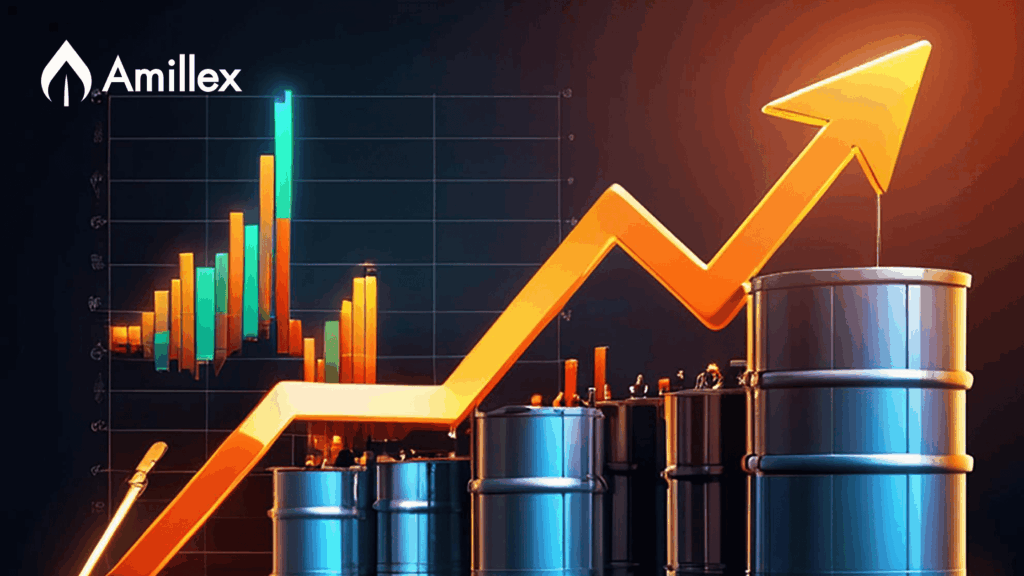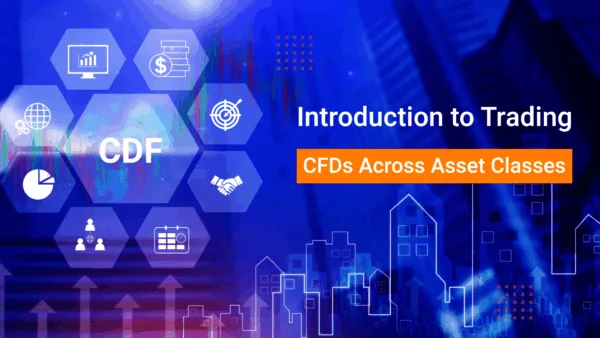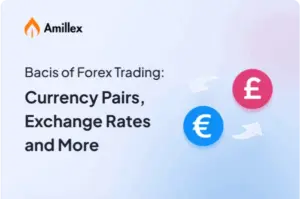差价合约 (CFD) 交易已成为金融市场上最受欢迎的交易形式之一,让交易者无需持有标的资产即可交易各种资产类别。这种交易机制因其灵活性、杠杆率以及在市场上涨和下跌时都能获利的能力,吸引了众多新手和经验丰富的交易者。
本指南将全面探讨差价合约 (CFD) 交易的主要资产类别,包括外汇、股票、商品、指数、债券和加密货币。无论您是新手还是已有一定交易经验,本文都能为您提供宝贵的见解,让您了解差价合约的运作方式以及相关的潜在收益和风险。
什么是 CFD(差价合约)?
差价合约 (CFD) 是一种金融衍生品,允许交易者在不实际持有资产的情况下,对各种资产类别的价格变动进行投机。CFD 本质上是交易者与经纪商之间达成的一项协议,用于兑换合约开仓和平仓期间资产价值的差额。
差价合约 (CFD) 允许交易者在预期价格上涨时做多(买入),或在预期价格下跌时做空(卖出)。差价合约 (CFD) 能够从市场上涨和下跌中获利,对于希望利用市场波动获利的交易者来说,是一个颇具吸引力的选择。
差价合约还提供杠杆,这意味着交易者可以用较少的资金控制更大的仓位。杠杆可以放大利润,但也可能增加潜在损失,因此风险管理是差价合约交易的关键环节。

探索差价合约交易的主要资产类别
外汇(外汇市场)
外汇市场是全球规模最大、流动性最强的金融市场,日均交易量超过146万亿。外汇交易涉及一种货币与另一种货币的兑换,货币对的价值会受到多种因素的影响,包括利率、地缘政治事件和经济指标。
外汇市场的差价合约交易允许交易者对欧元/美元、英镑/美元和美元/日元等货币对的价格走势进行投机,而无需实际兑换这些货币。通过外汇差价合约,交易者可以享受低点差、杠杆以及每周五天、每天24小时交易的优势。
外汇差价合约的主要优势:
- 高流动性:外汇市场的庞大规模确保交易能够快速执行,并将滑点降至最低。
- 杠杆:外汇差价合约提供高杠杆,允许交易者用相对较少的资金控制大额头寸。
- 进入全球市场:外汇差价合约提供全球货币的敞口,使交易者能够利用宏观经济趋势和地缘政治事件。
风险:
- 高波动性:外汇市场波动性极高,新闻事件或经济数据发布可能会引发价格突然波动。这种波动性虽然带来了获利机会,但也增加了重大亏损的风险。
股票差价合约
股票差价合约允许交易者在不持有实际股票的情况下,对单个公司股票的价格走势进行投机。这种交易形式越来越受欢迎,因为它为交易者提供了从价格波动中获利的机会,而无需投入大量资金。
在交易股票差价合约时,交易者如果认为股价会上涨,可以做多(买入);如果预期股价会下跌,可以做空(卖出)。传统股票交易只有在股价上涨时才能获利,而股票差价合约则允许交易者从市场上涨和下跌中获利。
股票差价合约的主要优势:
- 无需所有权:交易者可以推测股票价格走势,而无需承担持有股票所带来的复杂性和成本。
- 杠杆:股票差价合约提供杠杆,允许交易者开设比传统股票交易更大的头寸。
- 卖空:股票差价合约允许交易者通过做空从价格下跌中获利。
风险:
- 股息和公司行动:股票差价合约虽然提供价格变动敞口,但交易者不会像实际持有股票那样获得股息或拥有投票权。股票分割或股息等公司行动也可能影响差价合约头寸。
- 隔夜费用:持有股票差价合约头寸隔夜可能会产生费用,随着时间的推移,这可能会侵蚀利润。
商品差价合约
黄金、石油和农产品等大宗商品是驱动全球经济的重要原材料。通过差价合约交易大宗商品,交易者无需持有实物商品,即可对这些重要资产的价格走势进行投机。
由于商品市场固有的波动性,商品差价合约在交易者中颇受欢迎。商品价格可能因供需因素、地缘政治紧张局势、天气状况和宏观经济趋势而大幅波动。
商品差价合约的主要优势:
- 多样化:商品差价合约提供多种资产类别的敞口,使交易者能够对冲通货膨胀或分散投资组合。
- 全球影响:大宗商品价格受全球事件影响,例如自然灾害、政治动荡以及产量变化。这为交易者提供了利用市场波动获利的机会。
- 杠杆:与其他差价合约一样,商品差价合约提供杠杆,使交易者能够以较少的资金控制较大的头寸。
风险:
- 高波动性:大宗商品市场可能因自然灾害或地缘政治冲突等意外事件而出现大幅价格波动,从而导致巨额收益或损失。
- 存储和运输成本:虽然交易者不必担心存储或运输实物商品的物流,但这些因素会影响商品差价合约的价格。
指数和债券差价合约
指数差价合约允许交易者通过交易单一工具来推测整个股票市场的表现,例如标准普尔 500 指数、富时 100 指数或德国 DAX 30 指数。指数差价合约并非专注于个股,而是代表特定市场或板块内一组股票的整体表现。
另一方面,债券差价合约提供投资政府或公司债券的机会,而无需持有实际债券。债券是政府或公司为筹集资金而发行的债务工具,其价格会根据利率和经济状况波动。
指数和债券差价合约的主要优势:
- 广泛的市场曝光:指数差价合约提供了一种了解市场或行业整体表现的方式,减少了分析个股的需要。
- 对冲:交易者可以使用指数差价合约来对冲市场低迷或分散投资组合。
- 杠杆:指数和债券差价合约都提供杠杆,允许交易者用更少的资本控制更大的头寸。
风险:
- 市场相关性:指数差价合约与大盘高度相关,因此如果整体市场趋势向下,指数差价合约的价值也会下降。
- 利率敏感性:债券差价合约对利率变化很敏感,当利率上升时,债券价格通常会下跌。
加密货币差价合约
近年来,加密货币作为一种新兴的创新资产类别备受关注。比特币、以太坊和瑞波币等加密货币基于区块链技术,在去中心化网络中运行。加密货币差价合约允许交易者在不持有实际货币的情况下,对数字货币的价格走势进行投机。
加密货币市场以其极高的波动性而闻名,价格经常在短时间内大幅波动。加密货币差价合约为交易者提供了从这些价格波动中获利的机会,无需设置钱包或浏览复杂的交易所。
加密货币差价合约的主要优势:
- 波动性:加密货币的高波动性为通过 CFD 交易获利提供了大量机会。
- 杠杆:加密货币差价合约提供杠杆,允许交易者放大其潜在回报。
- 无需钱包:交易加密货币差价合约无需设置和管理数字钱包或处理与交易所相关的安全问题。
风险:
- 市场波动:市场波动虽然能创造获利机会,但也增加了重大亏损的风险。交易者必须做好应对突然且意外的价格波动的准备。
- 监管不确定性:围绕加密货币的监管环境仍在不断发展,监管的变化可能会影响加密货币差价合约的价值。
跨资产类别差价合约交易的优势

差价合约交易具有几个关键优势,使其成为各种资产类别交易者的理想选择:
- 杠杆:差价合约使交易者能够以相对较少的资金控制大额仓位。这既放大了潜在的利润,也放大了潜在的损失,因此交易者必须谨慎使用杠杆。
- 进入全球市场:差价合约交易者可以通过单一平台进入多种资产类别和全球市场,实现多元化投资并接触各个经济部门。
- 无论是市场上涨还是下跌,都能获利:差价合约交易最显著的优势之一,就是能够做多(买入)或做空(卖出)。这意味着交易者可以从价格上涨和下跌中获利。
- 不拥有标的资产的所有权:差价合约交易者不拥有标的资产,这消除了与所有权相关的复杂性和成本,例如商品的实物存储或股票的投票权。
差价合约交易中的风险和注意事项
虽然差价合约交易具有多种优势,但它也存在固有风险:
- 杠杆风险:杠杆可以放大收益和损失。交易者必须意识到,虽然他们可以用少量资金控制大额仓位,但他们的损失可能超过初始投资。
- 市场波动:所有资产类别,无论是外汇、股票、商品还是加密货币,都容易受到市场波动的影响。交易者需要采用合理的风险管理策略,例如设置止损单和使用合适的仓位规模。
- 隔夜费用:持有差价合约隔夜仓位可能会产生额外费用,即隔夜融资费用。这些费用会影响长期盈利能力。
跨资产类别的差价合约交易为交易者提供了多功能且灵活的 获得广泛金融市场敞口的便捷途径。无论是交易外汇、股票、商品、指数、债券还是加密货币,差价合约交易者都可以利用杠杆,从市场波动中获利,并通过单一平台进入全球市场。
然而,交易者必须了解所涉及的风险,尤其是在使用杠杆时。适当的风险管理、持续的学习以及细致的市场分析是差价合约交易成功的关键。对于初学者和中级交易者来说,从模拟账户开始可以获得宝贵的经验,且无需承担亏损本金的风险。
在探索差价合约交易的过程中,请花时间加深知识,完善策略,并进行严格的风险管理。祝您交易愉快!






